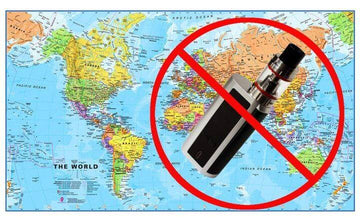Vaping, or the use of electronic cigarettes, has become a popular alternative to traditional smoking in many countries around the world. However, the regulations and laws surrounding vaping vary greatly from country to country.
United Kingdom
In the United Kingdom, e-cigarettes are considered a less harmful alternative to traditional cigarettes and are not subject to the same advertising and marketing restrictions. The UK government has also endorsed the use of e-cigarettes as a tool for smoking cessation. This has led to a significant increase in the number of vapers in the country.
United States
In the United States, the Food and Drug Administration (FDA) has regulated the sale and marketing of e-cigarettes since 2016. This includes restrictions on the sale of vaping products to minors and a requirement for premarket authorization of new e-cigarette products. Despite these regulations, vaping remains a popular choice among smokers looking to quit or reduce their tobacco use.
European Union
In the European Union, regulations on e-cigarettes have been implemented to ensure the safety and quality of the products. This includes restrictions on the maximum nicotine content of e-liquids and the advertising and marketing of e-cigarettes. However, some countries such as Belgium and the Netherlands have implemented stricter regulations, with Belgium completely banning the use of e-cigarettes in certain public places.
Canada
In Canada, the sale, possession and use of vaping products are regulated by the federal government and the provinces. The regulations vary from province to province, but most have banned the sale of vaping products to minors and imposed restrictions on advertising and promotion.
On the other hand, some countries such as Brazil and Singapore have banned the sale and use of e-cigarettes entirely. This is because of the potential health risks associated with vaping and the lack of research on the long-term effects of e-cigarettes.
In conclusion, the regulations and laws surrounding vaping vary greatly from country to country. While some countries have embraced e-cigarettes as a less harmful alternative to traditional smoking and a useful tool for smoking cessation, others have banned them outright. It is important for individuals to be aware of the laws and regulations in their own country before using e-cigarettes.
Australia
In Australia, the sale and possession of nicotine-containing e-cigarettes is illegal, but the use of nicotine-free e-cigarettes is permitted. The Therapeutic Goods Administration (TGA) has also implemented regulations on the importation and supply of e-cigarettes and e-liquids, including requirements for child-resistant packaging and warning labels.
New Zealand
In New Zealand, e-cigarettes are classified as a consumer product and are regulated under the Smoke-free Environments Act. The sale of e-cigarettes and e-liquids containing nicotine is illegal, but the use of nicotine-free e-cigarettes is permitted. The Ministry of Health also provides information and resources on the potential risks and benefits of vaping.
Japan
In Japan, the use of e-cigarettes is not prohibited, but advertising and promotion are heavily restricted. The sale of e-cigarettes containing nicotine is also restricted to pharmacies and medical institutions.
South Africa
In South Africa, the sale and use of e-cigarettes are currently unregulated, but the government has proposed regulations that would ban the sale of e-cigarettes to minors and prohibit the use of e-cigarettes in public places.
Russia
In Russia, the sale and use of e-cigarettes are not prohibited, but advertising and promotion are heavily restricted. The sale of e-cigarettes containing nicotine is also restricted to pharmacies and medical institutions.
China
In China, e-cigarettes are a rapidly growing industry and regulations vary depending on the province. Some cities and provinces have implemented restrictions on the sale and use of e-cigarettes, while others have not.
Summary
In summary, while some countries like the United States and the United Kingdom have embraced e-cigarettes as a less harmful alternative to traditional smoking and a useful tool for smoking cessation, other countries like Singapore, and Brazil have banned the sale and use of e-cigarettes entirely.































